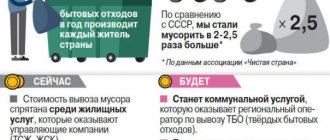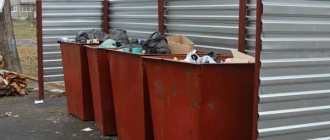Garbage collection in the village has become a standard public service since 2021. Residents of houses pay for the work of the waste management operator in the same way as they pay for electricity, gas and water. There is only one difference - if we can not use water and light and, accordingly, do not pay for unspent resources, then we will have to pay for garbage removal in any case, even if you process most of it into compost or destroy it in another way.
Payment for waste removal services is the responsibility of every citizen of the Russian Federation, since payment is calculated in most cases according to the number of people living in the house, and very rarely - according to the number of square meters of living space or the volume of waste. Services for waste removal from individual housing construction territories are provided by special licensed companies - regional operators with whom municipal authorities enter into contracts.
How to pay for garbage removal services in a private home
Payment for services for the removal of solid municipal waste by citizens living in rural areas is made in two ways - the choice of option depends on the person who has entered into an agreement with the regional operator for the provision of services:
- If the management company is engaged in organizing the removal, payment is made according to a general receipt, in which the amount for the corresponding service is displayed on a separate line;
- If the contract with the relocation operator was concluded by the owner of the property, then payment is made monthly on a separate receipt.
It’s more convenient and faster to pay online by registering a personal account on the regional operator’s website
Contents of the agreement with the regional operator
The law provides for the form of a standard contract for the provision of services for the management of solid waste (also approved by Resolution No. 1156).
According to clause 25 of the MSW Management Rules, approved. Resolution No. 1156 (hereinafter referred to as the Rules for the Management of MSW), the essential terms of the contract for the provision of services for the collection and transportation of MSW are:
Specifics of the contract for waste removal:
- its term cannot be longer than the term for which the operator was elected;
- in the event of expiration of the contract, unless one or both parties declare its termination, the contract is considered concluded on the same terms for a new term.
Note! In relations with new owners or tenants of residential buildings, the RO begins to fulfill its duties from the moment the right of ownership or other right to use the specified residential premises arises (subclause “c” of paragraph 148 (11) of the Rules for the provision of utility services, approved by Government Resolution dated 06.05 .2011 No. 354, hereinafter - Rules for the provision of public services).
The rules for the provision of utility services establish that an agreement with the owner of a private house, in addition to the above list, must also contain (clause 148 (13)):
What the Law says about waste removal from the private sector
In Russia there is no special law controlling the scope of waste removal in rural areas. Clients and providers are guided by the rules prescribed in several legislative acts:
- Letter of the Ministry of Natural Resources and Ecology of the Russian Federation No. 08-25-53/24802 “On sending clarifications on the issue of regulating activities in the field of MSW management” dated November 11, 2019;
- Federal Law No. 7 “On Environmental Protection” dated January 10, 2002 (as amended on December 27, 2019);
- “Rules for the management of municipal solid waste” (MSW), introduced by the Decree of the Government of the Russian Federation of November 12. 2021 No. 1156;
- Federal Law No. 89 of June 24, 1998 (as amended on December 27, 2019) “On production and consumption waste.”
Briefly, the main thoughts and tasks contained in these resolutions reflect the following theses:
- All citizens living in rural areas generate waste (MSW). Collection must be carried out in specially designated places for the purpose of timely removal and disposal;
- Management of MSW in rural areas (removal, destruction and disposal work) is the responsibility of regional operators (in accordance with Article 24.6 of Federal Law No. 89);
- The regional operator provides services in the village on the basis of an agreement concluded with the owners of households (in accordance with paragraph 1 of Article 24.7 of Federal Law No. 89);
- Concluding an agreement and paying is the responsibility of homeowners.
Paragraph 2 of Article 51 of Federal Law No. 89 states that house owners are prohibited from doing:
- Throw garbage into the water, onto the soil, into the subsoil;
- Leaving waste in any places not intended for waste storage, thereby harming the environment;
- Throw ash and other combustion products of waste materials into water, subsoil, soil, as they may contain chemical and radioactive compounds that poison the environment.
Rules for waste disposal in private homes
Garbage collection in rural areas is carried out according to the following scheme:
- Citizens remove and store waste in specially designated places: in containers or bags;
- The regional operator organizes waste removal according to the established schedule;
- The schedule should not contradict sanitary and epidemiological requirements, in accordance with clause 2.2.1 of SanPiN 42-128-4690-88.
The scope of municipal solid waste management includes collection, transportation, sorting of waste for the purpose of further processing or disposal and disposal.
House owners are required to pay for services provided by the regional operator. In case of refusal to pay, the provider has the right to go to court to collect the debt. Independent processing is punishable by administrative fines (according to the Administrative Code, Article 20.4):
| Nature of the violation | Amount of fine, (rub.) |
| Burning waste in a container intended for other purposes | 1 500 – 2 500 |
| Other rules for handling MSW are not followed | 1 000 – 2 000 |
| Accumulation of waste in violation of sanitary standards | 2 000 – 3 000 |
How waste will be removed, as well as how other actions will be carried out (for example, decisions will be made on the method of waste collection, location of sites) are decided by local authorities.
Branches, cut trees, old furniture do not belong to the category of solid municipal waste. This is bulky waste. It is removed for a fee by agreement with a company that has a license to work in the field of waste management of certain hazard classes.
No need for dirt. How an Altai village is trying to get away from bulk garbage collection
Not environmentally friendly and not economical. How an Altai village is trying to stop bulk garbage collection
In the village of Cheremnoye, Pavlovsk district, there are no containers or bins for waste. There, garbage is removed the old fashioned way - in bulk. People take bags of garbage to the road, and employees of the ECO-Complex relocation operator collect them. Everyone is dissatisfied: both the residents and the carrier. This is the most unecological and uneconomical way. Solving the problem and abandoning the “bestarka” can be quite simple, but the village authorities are in no hurry to take action. Read more in the TOLKA material.
Once every seven days
The village of Cheremnoye has about five thousand inhabitants. Garbage is collected here twice a week: on Saturdays and Sundays. One half of the village takes a full day's work. So people have to accumulate waste all week. In the private sector, residents are saved by taking bags with leftover food, containers or packaging out of the house, for example, into a barn or other outbuildings - there is nowhere else.
Garbage collection goes like this: at a certain time, people put bags outside the gate, a car arrives, and waste collection begins. A multi-ton truck is driving along rural streets at minimum speed, followed by a loader who collects bags and throws them into a garbage truck. Everyone suffers: transport wears out, the road is “broken”, colossal time is spent on work. It takes two days to remove all the garbage from the village. With containers, the work would take a day at most, or even less.
No need for dirt. How an Altai village is trying to get away from bulk garbage collection
“If portals were installed, the entire village could be completely cleaned up in a day. The volume of garbage here is approximately 10-12 tons. We could handle it in a day,” garbage truck driver Sergei Rybyakov told TOLK.
The garbage truck works exactly on schedule: if you don’t have time to deliver a bag of waste by a certain time, wait a week.
“The village is large, they don’t have time to quickly collect garbage everywhere. It often happens like this: you put out the trash, and lo and behold, the dogs have already taken it away. Then the residents themselves clean up. So we walk around and keep watch. These are the pies with kittens,” say residents.
“We have to take a shovel, brooms and clean it all up. Although we should not do this, it is the responsibility of the residents or the village council. But we step into the situation and take everything,” manager Alena Borovchenko comments on the situation.
No need for dirt. How an Altai village is trying to get away from bulk garbage collection
In addition, it is not possible to drive a KamAZ everywhere. When it rains, field roads wash out, so in some parts of the village garbage collection may be delayed for a day or even a week.
“It’s inconvenient - once every seven days. It turns out that we accumulate garbage all week, store it in order to throw it away. It lies there, rotting, smelling. Especially in the summer heat. Imagine when it’s below +30 for a week,” says Andrey, a resident of the private sector in the village of Cheremnoye.
Meanwhile, many residents say that it would be nice to install containers. True, with one thing: just not near my house, but a little to the side. Not everyone wants to be next to a trash can. At the same time, village residents are also in no hurry to install individual waste containers to prevent dogs from carrying trash.
Next to the apartment buildings in the village, instead of a container, there is a tractor body. Residents throw garbage into it all week long. The loader manually throws each package into the car. And it’s okay if the leftovers, for example, of food are packed. Some residents of Cheremny bring waste in a bucket and simply pour it into the cart.
No need for dirt. How an Altai village is trying to get away from bulk garbage collection
Solution
The solution to the problem is simple: abandon the bulk method of garbage collection and install bins. For all of Cheremnoe, about 20 drives are needed. One bunker costs almost 40 thousand (36 thousand rubles). But relocation operator ECO-Complex is ready to provide the municipality with 19 bunkers for safekeeping free of charge. The village council will not have to pay for them. You will only need to monitor the condition and safety of the container, you will also need to control that construction waste is not thrown into the bunker, and maintain order around the container. However, according to the carrier, the head of the village refuses the offer.
“Cheremnoye is harvested in bulk. According to Decree 1156 (which regulates the management of municipal solid waste. - Ed.), this method is not provided at all. This is uneconomical, environmentally unfriendly and impractical. We made a request to the head of Cheremny to provide us with storage areas where we could put bunkers. We did not receive an answer,” says head Alena Borovchenko.
No need for dirt. How an Altai village is trying to get away from bulk garbage collection
If the carrier does receive a response, then the garbage truck will only have to drive around all the points with containers, and not travel along almost all the streets of the village.
“We suffer from bulk export - the carrier incurs increased costs. I calculated the mileage - it doubles. For one export, we lose about 8 thousand rubles a day on fuel and lubricants alone,” comments Borovchenko.
According to the carrier, the head of the village council wants to receive not 19 containers, but three times more. But the registrar operator does not have such resources. In a conversation with TOLK, the head of the Cheremnovsky village council said that, firstly, no one offered him 19 bunkers, but only 10, and secondly, the entire village needs from 40 to 60 storage places. And finally, according to Alexey Petrov, the bulk method of garbage collection completely suits the residents of Cheremnoye. If not all, then the majority for sure.
“19 bunkers is half a village. And my village is divided into three parts. I proposed a combined method: in some parts of the village there are storage bins, in others the garbage is removed in bulk. To this, the carrier says: either we export it in containers or in bulk. We already take out the garbage two or three times a week with the help of the administration, because these carts are filled every day. It is unclear with whom to negotiate. I don’t see any constructive dialogue either. We also cannot coordinate the schedule, because it is not clear with whom to coordinate. In the coming days, I want to call GreenCity and send them the schedule so that I can publish it in places accessible to the population.
I see the following solution: either they offer us containers, I write a request to the district and we install bins in places of accumulation, or while neither they nor we have such an opportunity, we transport waste in bulk. The population is very happy with this,” Alexey Petrov, head of the Cheremnovsky village council, commented on the situation.
No need for dirt. How an Altai village is trying to get away from bulk garbage collection
“The territorial waste management scheme in the Altai Territory does not provide for such a method as bulk waste. This is rather a forced measure and is used in exceptional cases. According to the law, the organization of waste accumulation sites (sites) is the responsibility of local governments, as is maintaining a register of such sites. The municipality was supposed to be engaged in this work from 2021,” the press service of the relocation operator ECO-Complex commented to TOLK.
At the same time, Pavlovsky district is one of the most successful examples of the implementation of “garbage reform”. There are containers and bunkers installed in a number of villages here. Registrar "ECO-Complex" and its contractor "GreenCity" provided containers free of charge to the following municipalities: Novye Zori, Stukovo, Prudskoy, Sibirskie Ogni, regional center Pavlovsk and others. Perhaps very soon another item will be added to this list - the village of Cheremnoye.
Powers and responsibilities of regional operators
Regional operator is a legal entity responsible for organizing the complete process of handling municipal solid waste. That is, the service provider is responsible for the collection, transportation, processing, disposal, neutralization and disposal of MSW. The regional operator is selected based on the results of a competition held by the self-government bodies of the constituent entity of the Russian Federation. The administration enters into an agreement with the company that wins the competition.
Dilapidated furniture Metal doors From the apartment with movers Removal of solid waste Waste paper From cafes and restaurants
The area of responsibility of the regional operator is determined according to the developed territorial scheme. In order for a company to qualify for work in the waste management sector, it must meet a number of requirements:
- Be registered in the Russian Federation;
- Have a license to handle waste from hazard classes 1 to 4;
- Not in the process of bankruptcy. The company should not have an arbitration court decision to open bankruptcy proceedings, and liquidation proceedings should not be initiated against the applicant;
- Activities cannot be suspended due to an administrative offense;
- There are no debts on taxes, fees, or penalties. There are no penalties;
- The company's management has no outstanding convictions for crimes in the economic sphere.
After the agreement with the administrative authorities enters into legal force, the regional operator has a number of responsibilities:
- Organize the reception and collection of MSW in specially designated areas;
- Provide other steps within waste management;
- Provide customers with free and timely access to news and other information regarding waste collection activities (for example, changes in collection schedules, tariffs, etc.);
- Respond to complaints from service consumers;
- Replace damaged containers.
Specifically, you can find out about the responsibilities of the regional operator with whom the contract is concluded on the company’s official website.
Rules for handling MSW - what's new
Decree of the Government of the Russian Federation dated March 18, 2021 N 414 “On amendments to certain acts of the Government of the Russian Federation in the field of municipal solid waste management” is a legislative act that approves the rules for waste management, establishes the procedure for concluding contracts for the provision of services, and also specifies reasons why a regional operator may lose his position by terminating the contract with the administration.
The main changes affected the following issues:
- The list of special terminology has been supplemented with new concepts: “waste transfer station”, “reception point for secondary material resources”; “urn”, maintenance of the site for the accumulation of solid municipal waste. A more precise interpretation of other words and expressions is also given;
- Amendments have been made to the procedure for concluding an agreement for the provision of waste management services;
- There is an obligation to separate waste into groups in order to store each type of waste in its own container.
What other problems does the waste industry have?
According to the Russian Ecological Operator, regional operators in 11 subjects that have entered into the reform are now at risk of cessation of activity or bankruptcy due to non-payments. A significant part of regional operators will begin to go bankrupt en masse, which could lead to a failure in meeting the targets of the garbage reform, Ruslan Gubaidullin, head of the Clean Country association (which unites regional operators), told RBC. Among the main problems, in addition to non-payments, he named two:
- Operators do not have access to information about personal data of payers for waste removal. “It is necessary to change the federal law “On Personal Data” so that regional authorities can provide it to operators free of charge,” he noted. According to the founder and director of the Krasnoyarsk recycling company Ilya Ilyin, the lack of access to personal data of payers leads to low collection of payments, incorrect invoicing and the impossibility of collecting debt for waste removal in court. Mikhail Zakharov notes that the Federal Migration Service has such data, but it is not uploaded into a unified system. “The company’s employees go to the settlements from which they must remove waste and do the census themselves, which increases the costs of the waste management operator,” he said.
- Another important problem is the non-working measure to support operators related to their exemption from VAT, says Gubaidullin. Companies can invest this money in modernizing infrastructure related to waste management. “Business has an obligation to restore VAT amounts (that is, return part of this tax to the state. - RBC) legally accepted for deduction. As a result, the regional operator is obliged to pay this money to the budget from his own pocket,” complains the head of the association. According to Clean Country estimates, the amount of VAT to be “recovered” (paid) will be up to 10% of the operators’ forecast required gross revenue for 2021. “Regional operators who bought special equipment last year, for example, for 1 billion rubles, should have received 200 million rubles from this amount. reimbursement from the budget. But this year, by switching to a simplified taxation system, such transport operators will have to return 170 million rubles back to the budget, based on the service life of the waste removal vehicle and the residual value, Vergun noted. According to Gubaidullin, it would be advisable to free regional operators from the obligation to return this money to the state, but this requires amendments to the Tax Code.
There are more residents than registered residents - how to pay for garbage
Cases where not only registered people live in the house are often identified. The so-called “rubber” houses are inhabited by tenants, people who come to work, and less often by guests. Of course, the owners themselves are in no hurry to notify the management company or regional operator of the need to recalculate. Such houses are discovered by chance. Representatives of regulatory organizations draw up an act in which they register the actual number of temporary residents. Based on the document, payment for services is recalculated.
Recalculation is performed for citizens who live in the house for more than 5 days. This is the period established by law.
New tariffs for waste removal in the private sector
The cost of services is calculated at a rate per square meter of area in the following regions:
- Moscow region
- Leningrad region;
- Moscow and St. Petersburg;
- Amur region;
- Irkutsk region;
- Perm region;
- Tyumen region.
The amount to be paid is calculated using the formula:
S(house area) x regional tariff.
Other regions pay for waste removal based on the number of citizens living in the house. Below are the tariffs for some regions set in 2021. Find out the prices current at the time of reading the article on the official websites of regional operators:
| Region of the Russian Federation | Tariff (rubles per person) |
| Astrakhan region | 63,1 |
| Bashkortostan | 35,0 |
| Dagestan | 16-40 |
| Krasnodar region | 139,6 |
| Voronezh region | 157,5 |
| Samara Region | 140,0 |
| Kaliningrad region | 72,3-127,7 |
| Tula region | 137,3 |
| Tatarstan | 76,5 |
| Yakutia | 138,9 |
In regions where the calculation procedure is based on the actual amount of waste generated, payment is calculated for each liter of waste.
Complaint about non-collection of garbage online to REO
The official website of the REO radar is https://radar.reo.ru
So, the reasons for complaints from the population about the regional operator come down to the following:
- The garbage is not taken out, but receipts are received;
- Overflowing trash cans.
To quickly resolve the problem, it is recommended to submit an application to the Russian environmental operator. This is a public law company (PPC), which began operating in April 2019. Its task is to control the effective and legal management of MSW in the country.
Submitting a complaint is easy. Instead of sending letters with applications, you can go to the official PPK website in the “REO radar” section.
Complain about non-collection of garbage online - Step 1.
And click on the “report violation” button.
Complain about non-collection of garbage online - Step 2.
After this, the user is redirected to a page where a list of violations will be presented:
- Spontaneous landfill;
- Garbage collection violation;
- Discharge of waste of hazard class I;
- Dumping of hazardous waste;
- Illegal disposal;
- Disruption of the activities of solid waste landfills;
- Unpleasant odor;
- There are no containers for separate waste collection.
Complain about non-collection of garbage online - Step 3.
In this case, you need to select “violation of garbage collection”. The user will see a paragraph that briefly explains what is meant by this violation.
After reviewing, you need to click the “select reason” button.
Complain about non-collection of garbage online - Step 4.
The user is taken to a page where it is necessary to fill out some forms, namely:
- the exact address;
- description of the problem;
- email;
- password for registration.
It is recommended to first film the situation with non-collection of garbage (preferably day by day) using a digital camera or smartphone. Photos are uploaded into a special form. This allows you to provide visual evidence of the violation to the PPK REO.
Complain about non-collection of garbage online - Step 5.
After sending the complaint, the Russian environmental operator promises to correct the situation within 30 days.
Complain about non-collection of garbage online - Step 6.
Benefits and discounts for individual housing construction
For some categories of Russian citizens, payments for utility services are calculated taking into account benefits. Since waste removal has been equated with housing and communal services, the rules also apply to the area of solid waste management. Preferential amounts are calculated as a percentage and amount to:
- Minus 30% - for pensioners no older than 70 years;
- Minus 50% - for citizens aged 70-80 years;
- Minus 100% (services are provided free of charge) for people over 80 years of age.
The services of regional operators are also subject to discounts, benefits, and subsidies provided to WWII Veterans, disabled people, and low-income categories of citizens.
Pros and cons of Gref's initiative
- “Including a payment for waste management in a single payment document would help increase the collection of fees for this service from the population. It’s always easier to pay one payment at once than to pay different receipts in several steps,” says Belyaeva. The collection of payments for garbage is better in those regions where they are included in receipts for electricity, and not where payment for this service must be made separately, confirms Gubaidullin. “The electricity or gas may be turned off for non-payment, but the garbage will still be taken out, so it is considered that you don’t have to pay for it,” he explains.
- For example, the Moscow region, with the beginning of the garbage reform in January 2021, introduced the line “handling of solid waste” into a single payment document for 100% of residents of apartment buildings, and in the private sector - into receipts for electricity. Despite the fact that in the private sector the collection rate is traditionally low, these tools help to account for and increase the collection rate of payments for utility services, including for garbage collection, which in January-May of this year amounted to 93% of the target, in June-July - 96% , noted the press service of the deputy chairman of the regional government, Evgeniy Khromushin. According to the press service, a drop of 5–15% was observed only in the spring months of the coronavirus pandemic and self-isolation.
- According to the First Deputy Minister of Ecology of the Chelyabinsk Region, Yana Kuprikova, in Chelyabinsk the payment for garbage is issued by the regional operator as a separate receipt; in Magnitogorsk it is included in the receipt for light and heat. “Including a service fee for waste removal into a single payment document would be convenient and could increase payment collection,” she believes.
- But not all governors are ready to switch to centralized payment for all housing and communal services, including solid waste, since the total amount in one receipt may cause dissatisfaction among citizens, warns the head of the Clean Country. For example, in the Murmansk region, as a general rule, fees for garbage removal are not included in a single bill, since a separate payment document is prepared along with a receipt for electricity, the press service of the government of the Murmansk region reported. It is included in a single payment only for residents of those houses whose HOAs and management companies have entered into a direct agreement with the regional operator and issue such receipts to the population themselves.
Where to complain if they don't take out the garbage?
Appendix 1 to Government Decree No. 354 specifies the requirements for the frequency of garbage collection, which may vary depending on the region where the service is provided. The following standards apply to Moscow and the Moscow region:
- Garbage removal daily, once in the summer;
- Every three days - in winter;
- Allowable delay: in summer - 1 day, in winter - 2 days.
If the schedule established by law is violated, homeowners can file a complaint with the administration, management company, housing and communal services department, state housing inspectorate, Rospotrebnadzor. In case of malicious violations of legal requirements, you can send a complaint to the prosecutor's office.
Is it possible to refuse payment for garbage collection in the village?
Many home owners now continue to burn garbage on their property, or transport waste outside the locality, thereby violating the requirements of the law and falling under the article on administrative offenses (Article 20.4 of the Code of Administrative Offenses of the Russian Federation, fine 2,000-3,000 rubles).
Garbage removal in the private sector is the responsibility of the regional operator. Accordingly, one way or another, all citizens have to use the services of a specialized company, and therefore pay for its work.
Frequency of garbage collection
The period of temporary accumulation of garbage is determined based on the average daily air temperature for three days.
If the average daily temperature is plus 5 degrees Celsius or higher, then garbage must be removed every day. At a temperature of plus 4 and below - every three days.
However, in the regions of the Far North and in similar areas, as well as in hard-to-reach and sparsely populated areas, by decision of the chief state sanitary doctors of the constituent entities of the Russian Federation, the timing of temporary waste accumulation may be changed.
Garbage removal is carried out according to the established schedule from 7.00 to 23.00.











